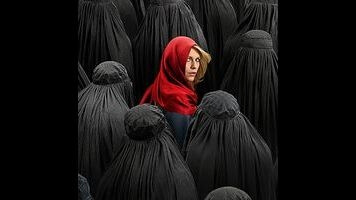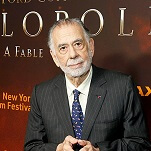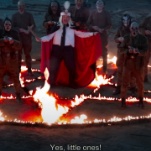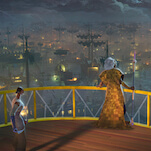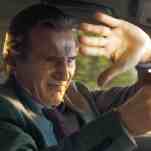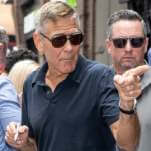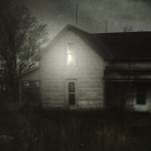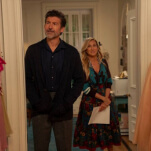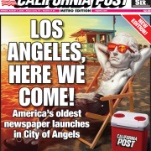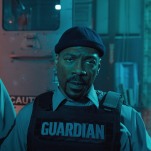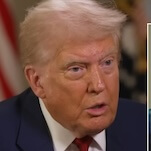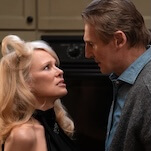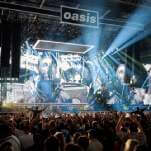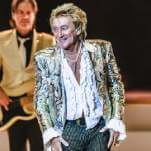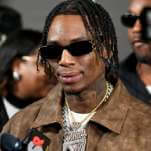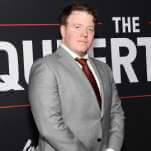What is this season of Homeland going to be about? Tonight’s season premiere offers two episodes, back-to-back, that attempt to answer that question, but while the show still feels like it has a pulse on international relations, it no longer feels like it’s offering something we absolutely need to watch. Homeland’s grasping at straws, here at the beginning of season four.
In part that’s because the show hit the reset button so hard it’s almost as if the last three seasons didn’t happen: There’s a baby with red hair and blue eyes, yes. But a naïve viewer could walk into this season and just start watching. Carrie’s story—and the interrelated stories of Peter Quinn, Saul Berenson, and CIA Director Andrew Lockhart—could be happening to another group of CIA operatives in another universe.
They almost are, anyway. Aside from one tense moment in the van, the real players here are the targets of Carrie and Quinn’s drone warfare and the isolated agents in the field. Carrie’s so removed from the action that her brief walk through the streets of Kabul is the first time she’s left the embassy in days; her job consists of signing off on a remote attack a hundred or more miles away, viewed on a monitor. Quinn’s placement in his early scenes is all indoors, under fluorescent lighting, printing and faxing and picking up Carrie from the airport. Saul’s in a sterile meeting and then indoors in his white, brightly lit loft apartment with Mira. And back at home in D.C., Lockhart is wearing suits in an air-conditioned office, while Maggie has a baby, a mansion, and cloistered suburban life, coming in at first through Carrie’s computer screen as they Skype. The architects of the war on terror exist far away from where the war on terror is, and Homeland, true to its title, brings that home.
“The Drone Queen” is a good, if not great, episode of Homeland. The show is still working to hit its emotional beats, but Lesli Linka Glatter exploits the episode’s quiet moments with her direction, focusing on the daily rituals of Carrie Mathison trying to keep her shit together as a way of quietly confirming that this is a woman on the edge. The earplugs and blinders and drugs Carrie requires for sleep, the lipstick in her pocket to smooth over the mess of botching an operation, and the careful space between her and the rest of her colleagues indicate a woman with a troubled conscience, putting a good face on something that is at its core pretty rotten.
Because Homeland does something it hasn’t done yet in this premiere: It makes Carrie the bad guy. Not the terrorist, exactly. But Carrie is the station chief that, in the opening minutes of the season, orders a bomb strike that kills 40 Pakistani civilians at a wedding. And she doesn’t really feel bad about it. Her employees call her “The Drone Queen” and present her with a birthday cake right after she orders a quick and dirty airstrike; it’s heartless, and the show knows it’s heartless. The operation goes south after Corey Stoll’s Sandy feeds Carrie some bad information and is killed by a mob as a result—in a scene where the hermetically sealed interior of the car is breached by a mob of (justifiably) angry Pakistanis, looking for revenge. It’s the most tense scene in tonight’s two-parter, and is carried off magnificently—the smear of blood on Carrie’s face in the car, and Quinn’s terror as he starts shooting wildly into the crowd, are hard to forget.
The opening episode sets an interesting goal for the rest of the season: It has to explain what the hell happened in those two chaotic days, with a high body count and a lot of unanswered questions. That means, to some degree, returning to that same opening sequence again and again—picking it apart for clues. It’s a good idea—a kind of traditional spy story, in the vein of Tinker Tailor Soldier Spy, with Carrie as our Smiley.
But the problem, as revealed in “Trylon And Perisphere,” is that the show has no idea what it’s doing with Carrie, a character it wants to make its emotional center. Carrie makes sense under and Glatter’s and Alex Gansa’s aegis, as she’s shuttling around Afghanistan and Pakistan. When she’s made to return to D.C. in the second episode, things get weird really fast.
It makes sense—Carrie herself said to Brody in season one, in one of their first moments of dropped artifice, that no one “over here” really got what it was like “over there.” But it’s been a long time since then, and Carrie’s seen a lot. And based on who she is in the first episode, it’s a little perplexing to face who she is in the second, where she almost runs away from her own daughter, before attempting to drown her in a bathtub.
It’s not just that it’s ridiculous and milked for shock value—it’s both of those things, yes. But more importantly, it just doesn’t seem like something Carrie would do. And going through the first two episodes, it’s actually extraordinarily difficult to pin down exactly who or what Carrie Mathison is. So much of what defined her character in the first season was a barely contained mania for finding wrongdoing and preventing another 9/11. Now it seems like Carrie is just a company woman, mostly interested in ditching her responsibility to her daughter and strongarming Director Lockhart for a plum position in Islamabad. (Is it a hardship position? Yes. But it’s also the one with the most influence, and presumably, as with Kabul, it’s more money.) She isn’t terribly bothered by either Sandy’s abduction (and subsequent murder) or her own complicity in the death of 40-odd civilians at a wedding. Carrie Mathison isn’t middle management; she’s scarily good at her job and will go to any length to do it right. Does that really mean accepting glib intelligence from an anonymous source and acting on it immediately—and then brushing it under the rug when it sours on her?
Positioned as her doppelgänger, in Brody’s stead, is Suraj Sharma’s Aayan Ibrahim, a Pakistani medical student whose mother, sister, and uncle are all killed in the strike. In the first episode, in which Carrie and the Americans we know are all filmed largely inside, Aayan spends almost the entire episode out of doors—or at least lit by the desert sun. Carrie is literally looking down upon him, from a drone camera investigating the carnage; Aayan is literally dug out of the rubble and looking up at the camera, recognizing it for what it is. There’s a story here about privilege, for sure. There’s also a story here about being able to feel something for the people around you. Carrie is so blocked, emotionally, that she’s wooden; Aayan is communicating half the time in Urdu, and he’s more emotive.
My assumption is that this is heading somewhere—Homeland is very aware of the emotional trauma of war, and it explores it in these two episodes with the slow unraveling of Rupert Friend’s Quinn, who uncovers both a romantic side and a nasty streak of unhinged violence after just 24 hours back on American soil. His story, in its spare details, works vastly better than Carrie’s, even though she gets far more screen time.
It at least sets everything up, though: While life without Brody is going to be difficult to navigate for both Carrie and the show, the first two episodes are careful, but not boring. Next week, in “Shalwar Kameez,” Glatter returns to direct and Nazanin Boniadi returns as Fara; whatever the story is in Islamabad, the stage has been set to draw it out.
Stray observations:
- It occurred to me that the interior/exterior imagery, and the extraction of someone buried underground, is a strong motif in the first season: Brody, too, was pulled from a hole in the ground, brought from darkness to light. Carrie and Virgil bug the interior of his house. Then his first major attempt at killing the vice president happened in an underground bunker. There’s something there, and writer Alex Gansa is exploiting it, just as Glatter is.
- “Trylon And Perisphere” refers to these two structures at the 1939 World’s Fair in New York City. I have literally no idea why the two make up the title of this episode, though, further souring me on what feels like a poorly conceived idea.
- “If it wasn’t a wedding, it was a mosque we hit. Or an orphanage. Or a mosque… for orphans.”
- Saul and Mira’s apartment in New York is bangin’. Break me off a piece of that.
- “In three years I’ll be pickled and on the top shelf.”
- “Is a normal bowel movement too much to ask for?”
- Fact-finding mission on this line from Lockhart: “It’s not even a country, you know, it’s a fucking acronym.” Turns out that is true. A pamphlet in the ’30s introduced the name and somehow it caught on by 1947. “Pak” means “pure” in Urdu, so the name also works in the traditional “-istan” suffix in that part of the world—“Land of the pure.”
- “There’s not even a diagnosis for what’s wrong with you.”
- Lastly: Surely we can all agree that this is the dumbest key art of all time?
It strikes me as tone-deaf in a way the show almost never is about the Arab world—burqas come in many colors; women choose to take the veil in many different ways; Carrie is not going undercover as a blonde in a red hijab, okay? This is not about Carrie infiltrating the Other, and it never was. It also, as this tweet observes, makes Carrie out to be the worst spy ever.
